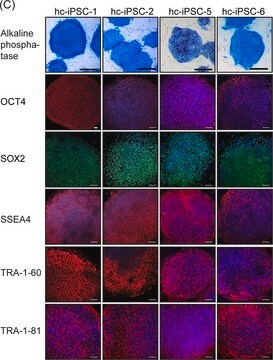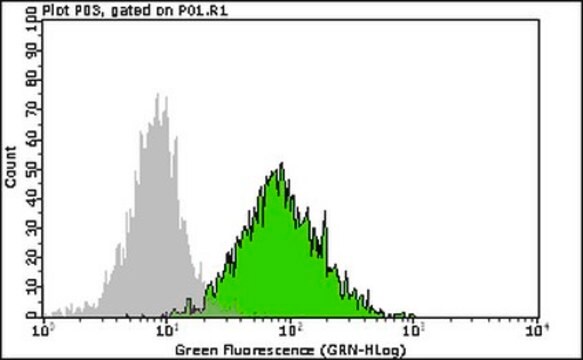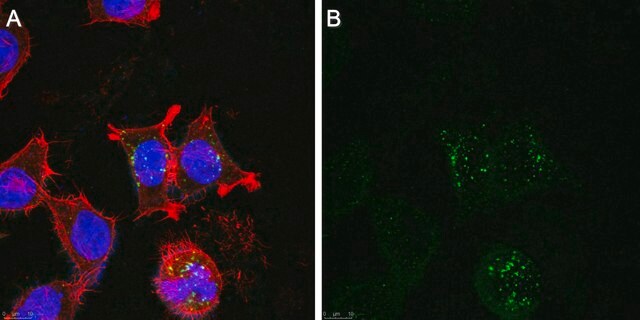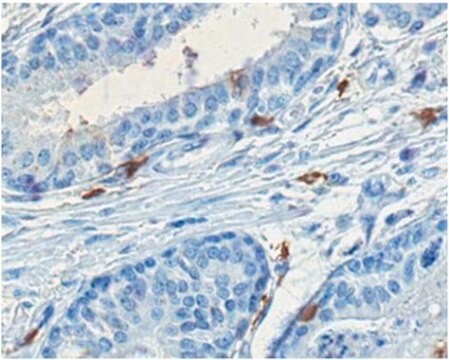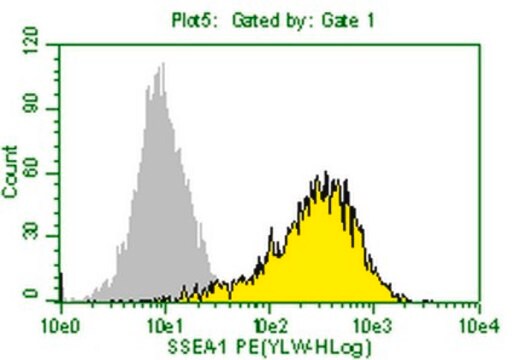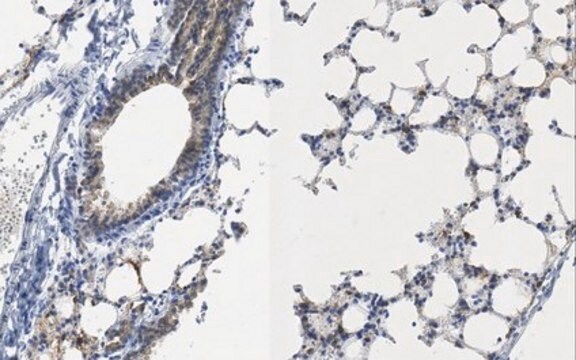MAB4303-I
Anti-Stage-Specific Embryonic Antigen-3 Antibody, clone MC-631
clone MC-631, from rat
Synonyme(s) :
Stage-Specific Embryonic Antigen-3
About This Item
Produits recommandés
Source biologique
rat
Niveau de qualité
Forme d'anticorps
purified antibody
Type de produit anticorps
primary antibodies
Clone
MC-631, monoclonal
Espèces réactives
human
Réactivité de l'espèce (prédite par homologie)
mouse
Technique(s)
flow cytometry: suitable
immunocytochemistry: suitable
immunofluorescence: suitable
immunohistochemistry: suitable
Isotype
IgMκ
Conditions d'expédition
wet ice
Modification post-traductionnelle de la cible
unmodified
Description générale
Spécificité
Immunogène
Application
Immunocytochemistry Analysis: A representative lot detected SSEA-3 immunoreactivity among T
cell-derived iPSCs (TiPSCs) by fluorescent immunocytochemistry (Kishino, Y., et al. (2014). PLoS One. 9(5):e97397).
Immunocytochemistry Analysis: A representative lot detected the presence of SSEA-3-positive cancer stem cells (CSCs) among cultured HCT116 colorectal cancer (CRC) cells by fluorescent immunocytochemistry (Suzuki, Y., et al. (2013). Int. J. Oncol. 42(1):161-167).
Immunocytochemistry Analysis: A representative lot detected SSEA-3 immunoreactivity among induced pluripotent stem (iPS) cells from human molars-derived mesenchymal stromal cells (MSCs) by fluorescent immunocytochemistry (Oda, Y., et al. (2010). J. Biol. Chem. 285(38):29270-29278).
Flow Cytometry Analysis: A representative lot detected the presence of SSEA-3-positive cancer stem cells (CSCs) in five cultured colorectal cancer (CRC) cell lines, HCT116, Caco-2, DLD-1, HT-29, and SW480 (Suzuki, Y., et al. (2013). Int. J. Oncol. 42(1):161-167).
Immunofluorescence Analysis: A representative lot detected a mall number of SSEA-3-positive stromal cells in normal colorectal epithelia and SSEA-3-positive cancers in colorectal adenocarcinomas by fluorescent immunohistochemistry using frozen tissue sections (Suzuki, Y., et al. (2013). Int. J. Oncol. 42(1):161-167).
Stem Cell Research
Cell Cycle, DNA Replication & Repair
Qualité
Flow Cytometry Analysis: 1.0 µg of this antibody detected Stage-Specific Embryonic Antigen-3 in H9 cells.
Liaison
Forme physique
Stockage et stabilité
Autres remarques
Clause de non-responsabilité
Vous ne trouvez pas le bon produit ?
Essayez notre Outil de sélection de produits.
Code de la classe de stockage
10 - Combustible liquids
Classe de danger pour l'eau (WGK)
WGK 2
Point d'éclair (°F)
Not applicable
Point d'éclair (°C)
Not applicable
Certificats d'analyse (COA)
Recherchez un Certificats d'analyse (COA) en saisissant le numéro de lot du produit. Les numéros de lot figurent sur l'étiquette du produit après les mots "Lot" ou "Batch".
Déjà en possession de ce produit ?
Retrouvez la documentation relative aux produits que vous avez récemment achetés dans la Bibliothèque de documents.
Notre équipe de scientifiques dispose d'une expérience dans tous les secteurs de la recherche, notamment en sciences de la vie, science des matériaux, synthèse chimique, chromatographie, analyse et dans de nombreux autres domaines..
Contacter notre Service technique